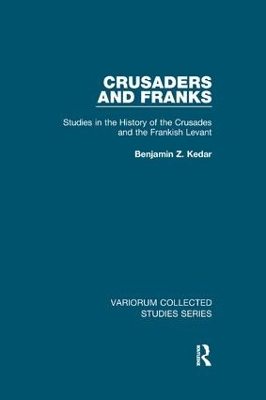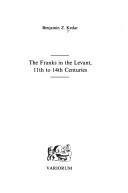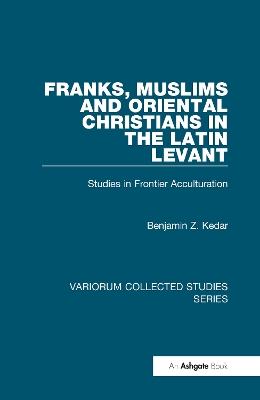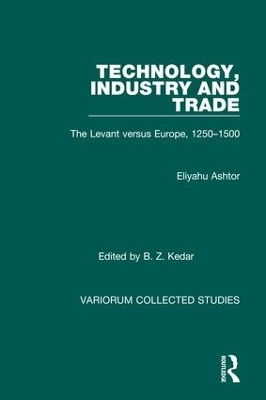Variorum Collected Studies
4 total works
While research on the crusades tends increasingly to bifurcate into study of the crusade idea and the crusading expeditions, and study of the Frankish states the crusaders established in the Levant, Benjamin Kedar confirms-through the articles reproduced in this latest selection of his articles-his adherence to the school that endeavours to deal with both branches of research. Of the ten studies that deal with the crusading expeditions, one examines the maps that might have been available to the First Crusaders and their Muslim opponents, another discusses in detail the Jerusalem massacre of July 1099 and its place in Western historiography down to our days, a third sheds light on the largely neglected doings of the Fourth Crusaders who decided to sail to Acre rather than to Constantinople, while a fourth exposes unknown features of the well-known sculpture of the returning crusader-most probably Count Hugh I of Vaudemont- who is embracing his wife. Of the ten studies that deal with the Frankish Levant, one proposes a hypothesis on the composition stages of William of Tyre's chronicle, another provides new evidence on the Latin hermits who chose to live in the Frankish states, a third examines the catalogue of the library of the cathedral of Nazareth, while a fourth calls attention to convergences of Eastern Christians, Muslims and Franks in sacred spaces and offers a typology of such events, and a fifth proposes a methodology for the identification of trans-cultural borrowing in the Frankish Levant.
CS 423
The Franks in the Levant, 11th to 14th Centuries
by Professor Benjamin Z. Kedar
Published 2 December 1993
A study of the Franks in the Levant between the 11th and 14th centuries, before, during and after the crusades.
Franks, Muslims and Oriental Christians in the Latin Levant
by Professor Benjamin Z. Kedar
Published 28 November 2006
Steven Runciman characterized intellectual life in the Frankish Levant as 'disappointing'; Joshua Prawer claimed that the Franks refused to open up to the East's intellectual achievements. The present collection, the second by Benjamin Kedar in the Variorum series, presents facts that require a modification of these still largely prevailing views. The earliest laws of the Kingdom of Jerusalem were influenced by Byzantine legislation; medical routine in the Jerusalem Hospital, unparalleled in Europe, had counterparts in Oriental hospitals; worshippers of different creeds repeatedly converged; multi-directional conversion recurred time after time. Several articles deal with groups that did abstain from intercultural contacts: Muslim villagers, Frankish clerics and hermits. One article dwells on the asymmetry of Frankish and Muslim mutual perceptions. The volume concludes with studies of specific locations: one argues that Acre was considerably larger than hitherto assumed, another compares its Venetian and Genoese quarters and attempts to locate the remains of a main street, a third reconstructs the history of Caymont.
Technology, Industry and Trade
by Eliyahu Ashtor and Professor Benjamin Z. Kedar
Published 28 April 1992
This is the fifth collection of articles by Eliyahu Ashtor to be published by Variorum and focuses on the fundamental question of why, during the later Middle Ages, technology and industry declined, even collapsed, in the Muslim Levant, while simultaneously making enormous progress in the Christian West. An indefatigable researcher in archives all over the Mediterranean, Ashtor amassed quantities of data on this subject, and began to propose causal links between, on the one hand, demographic trends, types of political regime, economic policies and attitudes towards innovation, and on the other, the progress or decline of technology and industry. Although his work was cut short by his death in 1984, the information that Ashtor has made available, for instance on the sugar and the alkali industries, and the questions and hypotheses he has suggested will provide a vital basis for continuing research. The final article, dealing more specifically with the history of commerce, represents in effect a summation of the author's views on the role of the Jews in the trade of the Mediterranean. La cinquième collection d’articles d’Eliyahu Ashtor à être publiée par Variorum (pour les deux volumes encore disponibles, voir p.00) se concentre sur la raison fondamentale pour laquelle, durant le Bas Moyen Age, la technologie et l’industrie dans le Levant musulman étaient en déclin, voire même en plein effondrement, alors qu’elles faisaient simultanément d’énormes progrès dans l’Ouest chrétien. Cherchiste infatiguable des archives méditerranéennes, Ashtor a amassé quantité d’informations à ce sujet et a commencé à suggérer l’existence de lien de cause entre: d’une part, les tendances démongraphiques, les types de régimes politiques, la politique économique et les attitudes vis-à -vis du changement et, d’autre part, le progrès ou le déclin de la technologie et de l’industrie. Bien que son travail ait été interrompu par sa mort en 1984,



